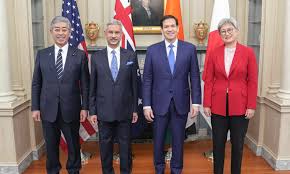Quad evolving framework, like-minded nations may be added: Japan diplomat

A senior Japanese diplomat has suggested that the Quad alliance may soon grow beyond its four core members. Speaking at a recent strategic affairs forum, the official said that other like-minded nations could join the group. This marks a shift toward a more inclusive approach to security and cooperation in the Indo-Pacific region.
The Quad currently includes India, the United States, Japan, and Australia. These four democracies formed the alliance to promote peace, security, and free navigation in the Indo-Pacific. Over time, the group has also begun to focus on global issues such as climate change, health security, and emerging technologies.
Quad’s Flexible Structure Encourages Broader Partnerships
The Japanese diplomat emphasized that the Quad is not a fixed or exclusive club. Instead, it serves as a flexible platform that welcomes others who share its values. Countries that support democracy, international law, open trade, and regional security may become future partners.
This vision opens the door to stronger cooperation with many nations. The Quad could soon work more closely with others, even without granting full membership. This could happen through joint projects, working groups, or regional forums.
Which Countries Could Join or Collaborate?
The diplomat did not name any specific countries. However, experts have long discussed possible additions based on shared interests.
South Korea stands out as a strong democracy with advanced technology and economic influence.
Vietnam and the Philippines have shown interest in maritime cooperation due to rising tensions in the South China Sea.
New Zealand promotes peace and supports democratic values.
Some European nations, such as France and the UK, have already taken part in Indo-Pacific security exercises.
These countries may not join as full members. Still, they could join Quad-led initiatives on technology, cybersecurity, or climate change.
India and Japan Advocate for Inclusive Growth
India and Japan have both played key roles in shaping the Quad’s identity. They have encouraged the group to grow beyond military cooperation. Both nations support working with ASEAN countries and Pacific Island nations, helping build regional stability.
India values strategic independence. Still, it has deepened its cooperation with Quad partners while avoiding formal military alliances. Japan’s “Free and Open Indo-Pacific” vision supports multilateral ties. It also seeks shared efforts on infrastructure, green energy, and supply chains.
Together, India and Japan help the Quad remain open, transparent, and centered on shared goals.
Challenges in Broadening the Quad
Expanding the Quad may offer many benefits, but it also presents several challenges.
- Not all democracies share the same priorities. Aligning national interests will take careful negotiation.
- China may see expansion as a threat. This could increase regional tensions.
- Adding more members may make it harder to reach quick decisions or agree on policies.
Due to these challenges, Quad members may favor a gradual, issue-based approach to partnerships instead of immediate enlargement.
Beyond Security: Tackling Global Issues Together
The Quad is no longer only about defense or maritime security. It has transformed into a platform for solving modern global problems.
Quad countries have launched joint efforts to secure supply chains, fight pandemics, and reduce carbon emissions. They also support digital governance and space cooperation. Expanding these efforts with new partners could bring more success.
Japan’s support for flexible and inclusive partnerships reflects this shift. The Quad now focuses on long-term global challenges, not just regional rivalries.
Conclusion: A Broader Quad for a Changing World
The Quad is changing to meet the demands of a complex world. Japan’s recent statement shows that the alliance may soon work more closely with other nations that share its democratic values.
Rather than stay limited to four members, the Quad may take a network approach. This would allow other countries to collaborate on shared goals without formal entry into the group.
As new challenges emerge, from climate disasters to cyber threats, the Quad’s strength will depend on its ability to adapt and grow. With leaders like Japan and India supporting an open and inclusive structure, the Quad seems ready for its next phase.ew multilateral initiatives under the Quad umbrella.






